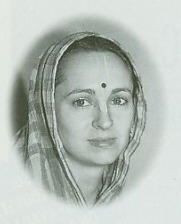
Urmila Devi Dasi
AFTER GIVING Arjuna knowledge of matter and spirit, Lord Krsna tells him, "Deliberate on this fully, and then decide what you wish to do." Our children also have to choose between material and spiritual life. To prepare them for this choice, do we need to give them experiences of both? Do our children need any experience of materialism to choose Krsna consciousness?
The sages do indeed say that to be complete in knowledge one must study both spirit and matter. But our children can best gain knowledge of illusion by seeing both illusion and reality from the perspective of reality.
Srila Prabhupada tells us that the most intelligent people learn simply by hearing. Hearing about Krsna gives a child a direct perception of spiritual happiness and knowledge. And as Krsna tells Arjuna, "Upon gaining this one thinks there is no greater gain." Spiritual experience, then, can give any child the intelligence to stay clear of materialism just by hearing about it.
But even if a child isn't convinced by his spiritual experience, adults don't have to arrange for children to have a taste of material life. Even without intervention from parents or teachers, each child feels material life moment by moment. What child has no frustrations or disease? What child doesn't come across envy, anger, and greed, if not in himself then in others? And what child doesn't see aging and death, at least in the animals and plants that surround him?
Our children will also get direct experience of bodily and mental pleasure. As distress comes, even uninvited, material happiness will also come.
A caring adult will use a child's naturally occurring painful and pleasurable experiences as a connection to what the child has heard from scripture. As Dr. Howard G. Hendricks writes in The Seven Laws of the Teacher, "You don't have to get hooked on cocaine to be aware of its devastation, and even many who are hooked don't understand the danger. So a better way to say it is: properly evaluated experience is the best teacher." (author's emphasis)
When adults say that for our children to understand maya we must expose them to it, they often mean they want to expose children to the illusions of illusion. They suggest taking children to amusement parks, or showing them television, or engaging them in much of the frivolities of childhood. But children who get a taste for such illusions generally become illusioned. Their higher knowledge and taste for Krsna become covered. The child asks for further and further indulgence in illusion, because, as Krsna tells us, material desires can never be satisfied. The parents then feel they must give the child maya because the child demands it; they forget that they themselves, the parents, sparked that demand.
A good parent or teacher tries to keep a child physically healthy. And there is a way to expose a child to disease in order to prevent disease vaccination. The Vedic scriptures offer a similar method for material life in general. A vaccination introduces a disease in a form that isn't dangerous. Similarly, conditioned souls can safely deal with matter in a changed form by using it in Krsna's service. So children can listen to music glorifying Krsna, eat food offered to Krsna, watch plays and movies about Krsna, use their talents to serve Krsna, and possibly later marry and raise a family in Krsna's service. This is a way to dovetail material inclinations with spiritual knowledge, to see both maya and Krsna and choose Krsna.
When maya is used in Krsna's service under the direction of a guru it ceases to work as a force of illusion. Rather, it acts spiritually to purify material desires.
Still, some adults insist that a child will learn best just through his or her own experiences, coming to Krsna consciousness naturally, just from experiencing material life, without any outside help.
In ancient times, also, there were parents who argued that their children would gain spiritual determination simply through their own material lives. An example cited in the Bhagavatam is that of Daksa. "Material enjoyment," he said, "is indeed the cause of all unhappiness, but one cannot give it up unless one has personally experienced how much suffering it is. Therefore one should be allowed to remain in so-called material enjoyment while at the same time advancing in knowledge to experience the misery of this false material happiness. Then, without help from others, one will find material enjoyment detestable. Those whose minds are changed by others do not become as renounced as those who have personal experience."
Sometimes we who have come to Krsna consciousness as adults assume that our determination to renounce material life is the result of a bad taste for illusory enjoyment. Yet in discussing Daksa's statement, Srila Prabhupada tells us that Daksa's philosophy is wrong. He writes, "The young boys and girls of the Krsna consciousness movement have given up the spirit of material enjoyment not because of practice [of material life] but by the mercy of Lord Sri Caitanya Mahaprabhu and His servants."
Why is the experience of material "enjoyment" not enough to teach us? Prabhupada explains, "Material nature is so strong that although a man suffers at every step, he will not cease in his attempts to enjoy."
Experience, then, won't enable a child to learn unless hearing comes with it. One longs for the happiness of serving Krsna not merely because one has become disgusted with materialism but because hearing from a great soul has sparked love of God in one's heart, so that by comparison material life has no allure.
Urmila Devi Dasi, initiated in 1973, has worked in ISKCON education since 1983. She and her family live in Hillsborough, North Carolina, where she runs an ISKCON school for children aged 5-18. She is the main author/compiler ofVaikuntha Children, a gurukula classroom guidebook.
